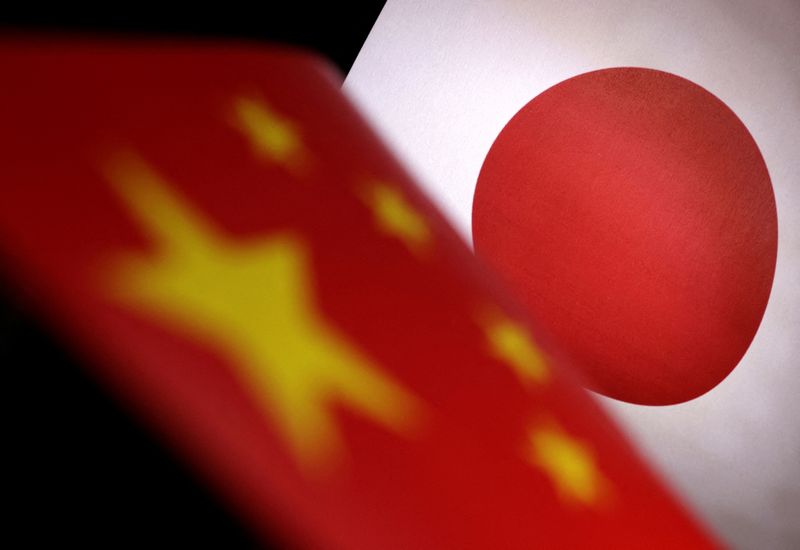By Takaya Yamaguchi, Makiko Yamazaki and Paritosh Bansal
TOKYO (Reuters) -Japan's financial regulator has sounded out top domestic banks about China risks and whether they have plans in place if Sino-Western tensions escalate, according to multiple sources with direct knowledge of the matter.
The Financial Services Agency's (FSA) request, which has not been previously reported, is to ensure Japan's megabanks are thinking about the risks and are prepared to respond if the geopolitical situation worsens, including over the issue of Taiwan's political status, said three of the sources.
Japanese megabanks Mitsubishi UFJ Financial Group (NYSE:MUFG), Sumitomo Mitsui Financial Group (NYSE:SMFG) and Mizuho Financial Group have a combined $6.5 trillion in assets, according to Refinitiv.
As of end-March, the three banks had total credit exposure of about $64 billion to China, or roughly 1% of their total assets, according to their financial statements. The number does not include all business unit of the banks.
A major risk for Japanese banks would involve U.S. sanctions on China, hobbling their ability to do business there similar to the bans on Russia dealings after the invasion of Ukraine, said one of the sources, who is a financial industry executive.
All the sources requested anonymity because of the sensitivity of the matter.
The FSA, MUFG and Mizuho declined to comment. SMFG said it declined to comment on anything related to dealings with regulators.
The FSA has not given the banks any specific directions for actions they need to take, one of the other sources said, adding the lenders were thinking about various eventualities and the regulator was hoping for their insights and information.
The FSA's request to look into China-related geopolitical risk was made in May, said two other sources. At a meeting last month, one of the banks was asked by the FSA how it is assessing risk related to China operations, one of them said.
The watchdog's move comes as tensions between China and Western allies have increased over the last 18 months amid a series of disputes involving the Russia-Ukraine war, Taiwan's sovereignty, and technology access.
In particular, tensions have risen between the United States and China.
U.S. Secretary of State Antony Blinken met with China's top diplomat Wang Yi on Monday at the start of the second and final day of a rare visit to Beijing aimed at ensuring that the many disagreements do not spiral into conflict.
CONTINGENCY PLANS
Japanese banks, like many multinational companies, find themselves faced with the prospect of being caught in the middle.
Top Japanese financial firms, led by banks, are heavily exposed to China either via their onshore operations in the world's second-largest economy or through their offshore business networks. They also do business in the West.
The regulator's move underscores how far-reaching the impact of a geopolitical crisis, such as one involving Taiwan, would be for the global economy and businesses.
China claims democratically governed Taiwan as its territory and has never renounced the use of force to bring it under its control. Taiwan strongly objects to China's sovereignty claims and says only the island's people can decide their future. China has over the past three years stepped up its pressure to try and force Taiwan to accept Beijing's sovereignty, including staging war games around the island.
Many global businesses worry an escalation of tensions could result in the U.S. imposing sanctions on China, as it did with Russia in the aftermath of the Ukraine war. They are taking steps such as drafting contingency plans and inquiring about manufacturing capacity outside Taiwan. Almost half of the companies surveyed by the American Chamber of Commerce in Taiwan are revising or plan to revise their business continuity plans amid tensions with China, Reuters reported in February.

For Japanese banks with large exposure to the United States, the impact of any Western sanctions against China is likely a greater concern than the fallout of their direct exposure to Taiwan, the financial industry executive said.
Dealing with China sanctions would be extremely complex, the executive added.